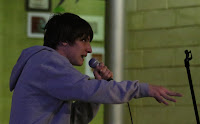Saturday, August 31, 2013
Fightback and retreats as Barnett pushes austerity
Public backlash and protest action have forced some partial backdowns by the government but the overall thrust of government policy remains fee increases and public sector staff cuts.
On budget day, senior ministers were spinning a line that the state has a debt problem. "Make no mistake, we have a problem with debt," said treasurer Troy Buswell. Barnett said the government had "no choice" but to increase fees.
These fee increases include increased costs for electricity, water and other utilities of approximately $235 per year. Other costs include increased car registration fees and a 12.5% increase to land tax alongside a reduction of $4000 for the first home owners grant for people buying established homes. (By contrast, first home buyers who purchase a newly built home will receive a $3000 increase in the grant. This is an indirect subsidy to the construction bosses.)
In a sign that the belt tightening isn't meant to be evenly spread through the community, corporations were rewarded with a $121 reduction in payroll tax.
One of the most pernicious stings in the budget is a new fee of $4000 per year per student for primary or secondary education for the children of workers on 457 visas. A family with five children would therefore be expected to pay $20,000 per year for public education.
This policy represents: an attack on a relatively weak section of the workforce; an attempt to increase the divisions between workers with and without residency rights; and possibly a "thin edge of the wedge" against the whole population. If a fee of $4000 can be normalised for workers on 457 visas it would be easier to extend that fee to the rest of the population later on.
The policy that attracted the most immediate opposition was a plan to halve the feed-in-tariff for households with rooftop solar systems. A voter backlash and lobbying campaign (in the context of federal Liberals in marginal seats also feeling the pressure during an election period) meant that the government backed down within four days.
Then on August 14, Barnett announced that he was prepared to back down over his plan to split the City of Vincent in two as part of the government's forced amalgamation policy. This comment came only four days after a 1200-strong protest rally opposing the plan.
While amending the boundaries is not a reversal of the developer-friendly plan to halve the number of local councils in metropolitan Perth, this is another demonstration that the government is susceptible to popular pressure.
This point was demonstrated again on August 27 when it was reported that the government is considering adjusting the $4000 education fee for children of 457 visa holders. Options being canvassed include means testing or exempting 457 visa holders who are already in the country. The government is still working on details of an amended scheme but once again there is a tension between the overall "economic rationalist" agenda of the government and the risk to government stability of provoking a more widespread protest movement.
The biggest potential threat to the government's agenda comes from the trade union movement. The budget also planned to cut 1200 workers from the public service and a further 500 jobs from public education. The government has also announced plans to close schools at a time when WA's population (and student numbers) are increasing.
The Civil Service Association representing public sector workers held a rally outside parliament on August 6. While militant delegate Janet Parker received a positive response to her call at the rally for a campaign of industrial action to oppose the cuts, the speech by CSA secretary Toni Walkington made clear that the union leadership has no plans for any campaign. There is discontent within the CSA over this lack of a serious response.
By contrast, an August 30 meeting of the State School Teachers Union executive has endorsed a plan for industrial action and a public rally on September 3.
"These cuts [to teacher and education support worker numbers] mean that staff numbers will be decreasing while student numbers will be increasing," said union President Anne Gisborne in a campaign website announcement.
"You don’t need to be a maths teacher to work out that this will result in bigger class sizes, which will lead to less personal attention for students and poorer leaning outcomes," she said.
United Voice, which represents school staff has also been campaigning against the staff cuts.
Fremantle councillor and Socialist Alliance candidate for Fremantle, Sam Wainwright, told Green Left that the partial backdowns by Barnett in the last month demonstrate that the government is susceptible to pressure.
"This government can be beaten but we need to ratchet up the momentum if we are to substantially reverse Barnett's cuts. Only a concerted and united industrial campaign by unions combined with protest by the community would have the power to totally stop them in their tracks."
[This article by Alex Bainbridge was written for Green Left Weekly #980.]
Public servants rally on August 6.
































